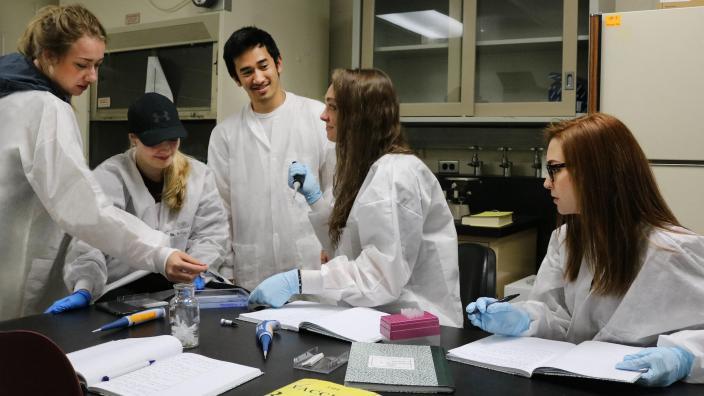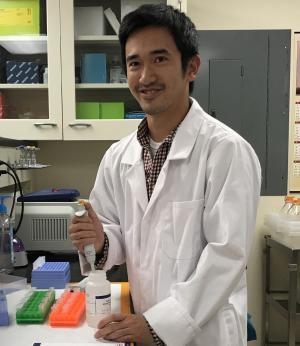He was in a cell biology lab with more than a dozen students. They collaborated in groups of two on the long black lab benches that filled the room.
“I sat next to my lab partner, Shahzaad Jahangier, and watched him use the microscope,” Binh says. “He did everything so effortlessly. He knew every process and easily handled the slides and test tubes. I asked how he knew the protocol so well."That’s when Shahzaad told Binh about the Pathways to Advanced Degrees in Life Sciences program and Dr. Andy Skildum, a Pathways mentor and professor/researcher in the Department of Biomedical Sciences.
A few months later, Binh started his first summer in the Pathways program.
PATHWAYS
Pathways is a 10-week long summer academy offered in a two-year cycle. In the first year, students learn how to execute lab protocols, and in the second year they are encouraged to perform their own research using those protocols. Students are compensated both in the summer sessions and also for their work as a lab assistant during the school year. The program strongly encourages students to apply who are from racial, ethnic, and other groups that are underrepresented in science and health-related fields.
Over the two years, professional and social skills are emphasized through debates, interviews, research and presentations. In the second year, students create posters based on their individual research to present at UMD and at national science conferences around the United States.
STUDENT DIRECTED LEARNING
One of the distinctive features of Pathways is an emphasis on problem-based learning (PBL). Students practice making a diagnosis by responding to a description of a real patient with real physical symptoms and their emotional and historical details. They use each other's thoughts and opinions to find gain new knowledge.
The program’s director, Dr. Ben Clarke says PBL gives students confidence. As a group they identify health issues and solve problems using the same process as physicians. “I want to give students who face obstacles in their everyday life a chance to succeed. As they work through the program, they find they can become scientists.”
REAL SCIENCE
This year, during his second Pathways summer, Binh is researching breast cancer cells in Dr. Skildum’s lab. “The research Binh performed here will go into a poster that will be presented at the UMD undergraduate research fair,” Dr. Skildum says. "There is a good possibility that Binh will take the poster to a national conference as well."
Binh is a senior biochemistry major and his Pathways research experience will help him an extra edge in his last year at UMD. "I really support the Pathways program. Over and over I see students come to realize they love science,” Dr. Skildum says.
Binh plans to apply for medical school in the coming months. He says the Pathways process has made him feel more self-assured. He and the other students have been encouraged to draw their own conclusions and make their own discoveries, and that has helped him. “It feels like someone actually values my opinion,” Binh says.
Above: Pathways students Sophia Green, Mackenzie Latterell, Binh Bui, Richelle Yunger, and Ashley Marcuson practice using lab equipment.

